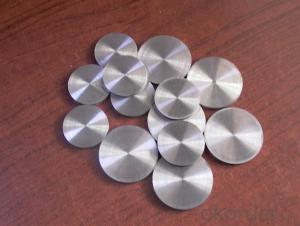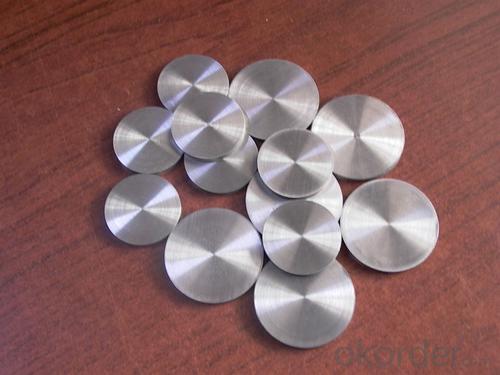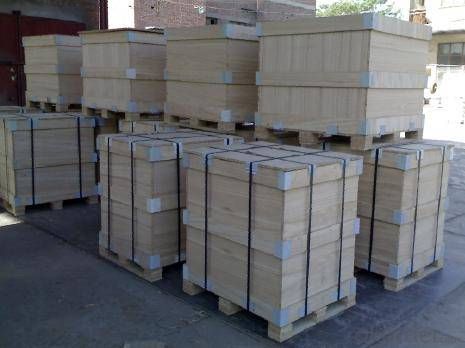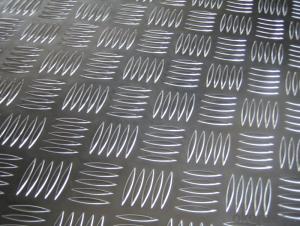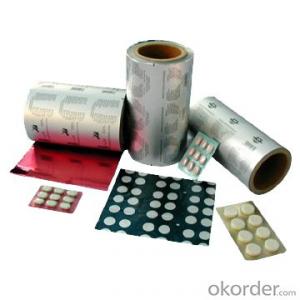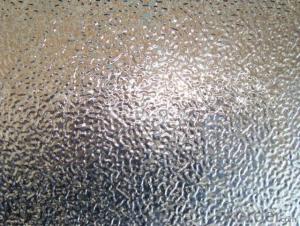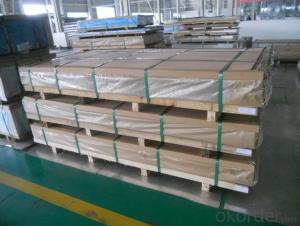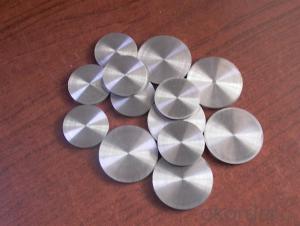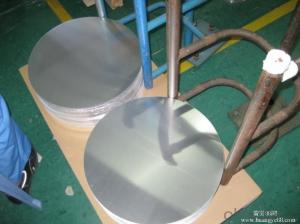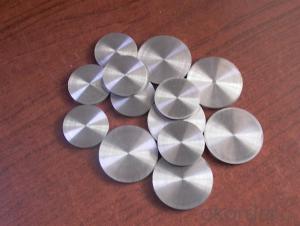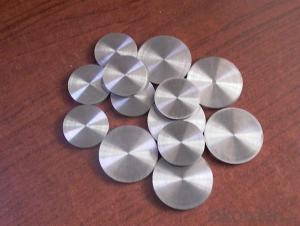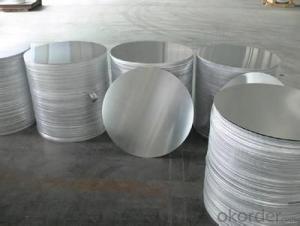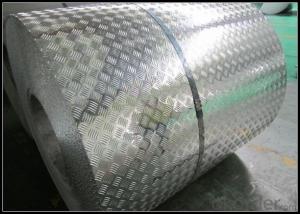Rippled Aluminum Sheets for Roofs - Direct Casting Aluminum Circle for Kitchen Pot
- Loading Port:
- Shanghai
- Payment Terms:
- TT OR LC
- Min Order Qty:
- 5 m.t.
- Supply Capability:
- 50000 m.t./month
OKorder Service Pledge
OKorder Financial Service
You Might Also Like
Specification
1.Structure of Direct Casting Aluminium Circle for Kitchen Pot
Direct Casting Aluminium Circle for Kitchen Pot is one semi-finished aluminium material. This strip can be rolled down to aluminium coil,sheet,circle ect. The alloy AA1050 is widly used in building, industry ect. Its weight is much lower than steel. So many customers choosed aluminium material instead of steel.
2. Main features of Direct Casting Aluminium Circle for Kitchen Pot
a.Competitive price---We have our own mills and can produce mill finished aluminium coils, so we can control the production cost better.
b.Professional after-sale service---We have more than 15 years exportation experience and you need not worry about the exporation problems.
c.Fast delivery time---We can control the delivery time within 35 days.
3. Image
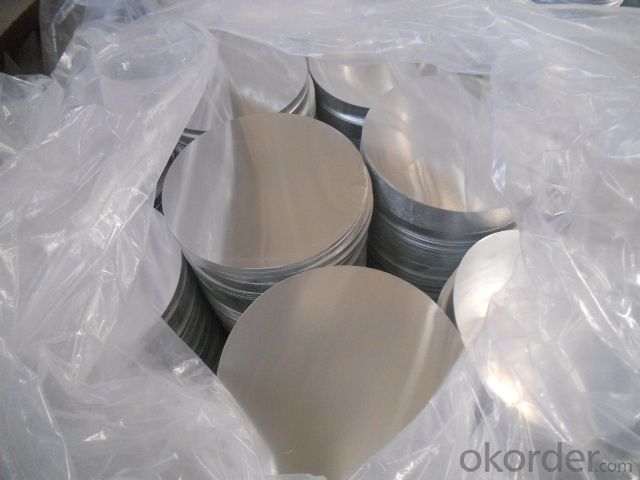
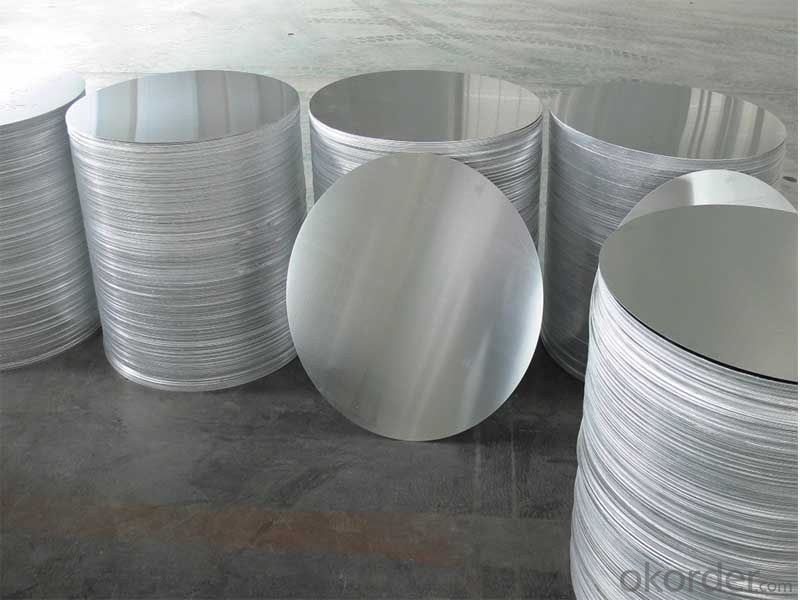
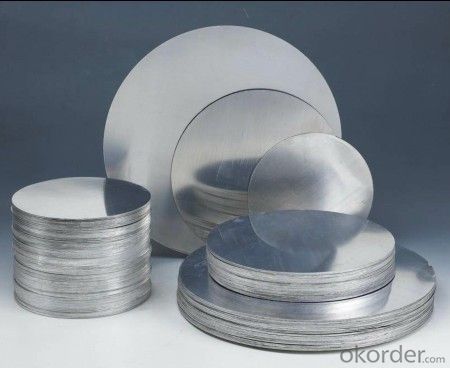
4. Product Specification
| ALLOY | TEMPER | THICKNESS | DIAMTER | ROLLING |
| AA1050 | H18 | 0.2MM-2MM | 100MM-900MM | DEEP |
5.FAQ:
What is the quality standard?
---Usually our standard is GB3880-2006
What is the largest width?
---It is 2300mm
What is the MOQ?
---Usually we can accept 80 tons.
- Q: Can the aluminum sheets be used for manufacturing power transmission lines?
- Yes, aluminum sheets can be used for manufacturing power transmission lines. Aluminum has several properties that make it suitable for this purpose. First, aluminum is a lightweight material, which makes it easier to handle and transport compared to other metals like copper. This can help reduce installation costs and make the power transmission lines more efficient. Second, aluminum has good electrical conductivity, although it is not as conductive as copper. However, due to its lighter weight, aluminum can still achieve similar electrical performance as copper while using less material. This can result in cost savings and lower energy losses in the transmission lines. Furthermore, aluminum has excellent corrosion resistance, which is crucial for power transmission lines that are often exposed to various weather conditions and environmental factors. Aluminum can withstand harsh conditions and maintain its structural integrity over time, ensuring the reliability and longevity of the power transmission infrastructure. In conclusion, aluminum sheets can indeed be used for manufacturing power transmission lines due to their lightweight nature, good electrical conductivity, and excellent corrosion resistance.
- Q: which kind of abraser should be used for deburring of aluminum sheet?
- as for the polishing of aluminum material, we usually nylon wheel and similar products.
- Q: Are aluminum sheets suitable for use in HVAC (heating, ventilation, and air conditioning) systems?
- Yes, aluminum sheets are suitable for use in HVAC systems. Aluminum is a popular material choice for HVAC systems due to its various beneficial properties. Firstly, aluminum is lightweight yet strong, making it easy to handle and install in HVAC systems. Its low density also allows for cost-effective transportation and reduces the overall weight of the HVAC units. Secondly, aluminum has excellent corrosion resistance. HVAC systems often encounter moisture and condensation, especially in air conditioning units, and aluminum's resistance to corrosion ensures its durability and longevity in such environments. Additionally, aluminum sheets have good thermal conductivity, allowing for efficient heat transfer throughout the HVAC system. This property is particularly important in heating and cooling applications, as it helps to distribute the desired temperature effectively. Moreover, aluminum is a non-toxic material, making it safe for use in HVAC systems that circulate air throughout buildings. It does not release any harmful particles or gases into the air, ensuring the quality of indoor air. Lastly, aluminum is a highly recyclable material, making it environmentally friendly. The ability to recycle aluminum sheets reduces the carbon footprint associated with HVAC systems and aligns with sustainability goals. Considering all these advantages, aluminum sheets are indeed suitable for use in HVAC systems, providing an optimal balance of strength, corrosion resistance, thermal conductivity, safety, and environmental friendliness.
- Q: What are the thermal conductivity properties of aluminum sheets?
- Aluminum sheets have excellent thermal conductivity properties. The thermal conductivity of aluminum is approximately 237 Watts per meter-Kelvin (W/mK), which is significantly higher compared to other commonly used metals such as steel or copper. This means that aluminum sheets are highly efficient in transferring heat across their surface. Aluminum's high thermal conductivity allows it to quickly conduct and distribute heat, making it an ideal choice for various applications that require efficient heat transfer, such as heat exchangers, cooling systems, and heat sinks. Additionally, aluminum's lightweight nature and corrosion resistance further contribute to its popularity in thermal management applications. Overall, aluminum sheets offer excellent thermal conductivity properties, making them a preferred material in industries where efficient heat transfer is crucial.
- Q: Are the aluminum sheets suitable for manufacturing electrical busbars?
- Yes, aluminum sheets are suitable for manufacturing electrical busbars due to their excellent electrical conductivity, lightweight nature, and corrosion resistance.
- Q: What is the fatigue limit of aluminum sheets?
- The fatigue limit of aluminum sheets refers to the maximum stress level at which the material can endure an infinite number of cyclic loadings without experiencing fatigue failure. Aluminum has a relatively high fatigue limit compared to other materials, which means it can withstand a significant number of load cycles before fatigue failure occurs. However, it is important to note that the fatigue limit of aluminum sheets can vary depending on factors such as the alloy composition, heat treatment, and surface conditions. Therefore, it is crucial to consider these factors and conduct proper testing to determine the specific fatigue limit of a particular aluminum sheet.
- Q: Is it feasible to recycle aluminum sheets and what factors contribute to its recyclability?
- <p>Yes, aluminum sheets can be recycled easily. Aluminum is one of the most recycled materials due to its lightweight, durability, and the energy efficiency of the recycling process. The recycling of aluminum requires only 5% of the energy needed to produce new aluminum from raw materials. Additionally, aluminum can be recycled indefinitely without losing its properties, making it an environmentally friendly choice. Proper sorting and collection systems are crucial for efficient recycling, and the demand for recycled aluminum is high in various industries, further facilitating its recycling process.</p>
- Q: Can aluminum sheets be used for outdoor applications?
- Yes, aluminum sheets can be used for outdoor applications. Aluminum is a durable and corrosion-resistant material, making it suitable for a wide range of outdoor uses. It is commonly used for roofing, siding, gutters, and outdoor signage. Aluminum sheets have high strength-to-weight ratio, which makes them ideal for applications where a lightweight yet sturdy material is required. Additionally, aluminum naturally forms a protective oxide layer that helps protect it from the elements, making it a reliable choice for outdoor environments.
- Q: Are aluminum sheets suitable for food storage applications?
- Yes, aluminum sheets are suitable for food storage applications. Aluminum is a widely used material in the food industry because it is lightweight, durable, and has excellent thermal conductivity properties. Aluminum sheets are often used to make food storage containers, foil wrap, and trays. These sheets provide an effective barrier against moisture, oxygen, and light, which helps to preserve the freshness and quality of food. Additionally, aluminum is non-toxic and does not react with acidic or alkaline food, ensuring that the taste and safety of the stored food are not compromised.
- Q: Can aluminum sheets be an alternative to glass in certain applications?
- Yes, aluminum sheets can be an alternative to glass in certain applications. Aluminum sheets offer several advantages over glass, making them a suitable choice in specific scenarios. Firstly, aluminum sheets are lightweight and durable, making them ideal for applications where weight is a concern, such as in aerospace or automotive industries. Glass, on the other hand, is relatively heavy and brittle, which can limit its use in certain environments. Additionally, aluminum sheets have excellent corrosion resistance, making them suitable for applications in marine or coastal environments where glass may deteriorate over time due to exposure to saltwater. Aluminum sheets also have a high strength-to-weight ratio, allowing for greater design flexibility and structural integrity compared to glass. Moreover, aluminum sheets can provide better thermal insulation properties compared to glass. They offer improved heat transfer resistance, which can be advantageous in applications where temperature control is crucial, such as in the construction industry. Furthermore, aluminum sheets can be more cost-effective than glass in certain applications. The production and installation costs of aluminum sheets are often lower compared to glass, making them a more economical choice for large-scale projects. However, it is important to note that glass still has its own unique properties and advantages that make it the preferred choice in many applications, such as its transparency and optical clarity. Glass also offers better resistance to scratches and chemical corrosion compared to aluminum sheets. In conclusion, while aluminum sheets can be a viable alternative to glass in certain applications due to their lightweight, durability, corrosion resistance, thermal insulation properties, and cost-effectiveness, the choice between the two materials ultimately depends on the specific requirements and constraints of the application in question.
Send your message to us
Rippled Aluminum Sheets for Roofs - Direct Casting Aluminum Circle for Kitchen Pot
- Loading Port:
- Shanghai
- Payment Terms:
- TT OR LC
- Min Order Qty:
- 5 m.t.
- Supply Capability:
- 50000 m.t./month
OKorder Service Pledge
OKorder Financial Service
Similar products
Hot products
Hot Searches
Related keywords
